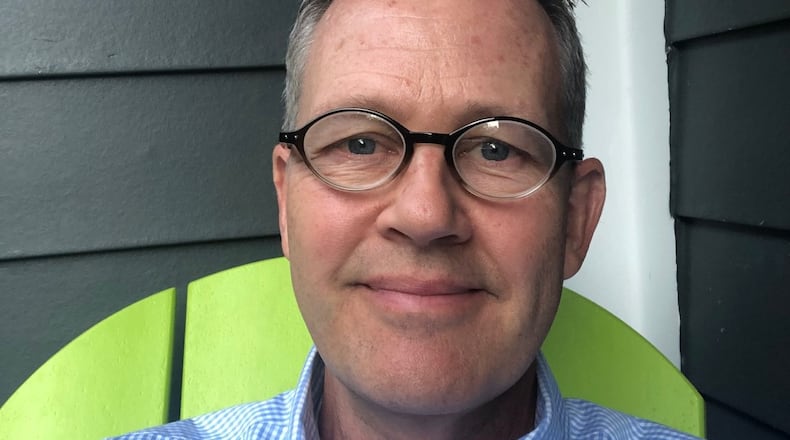As the nation goes into a third calendar year dealing with a pandemic, people are tired of taking precautions, being scared and limiting behaviors like traveling and gathering. But the highly transmissible omicron variant and soaring cases and hospitalizations in Ohio may necessitate some behavior changes again, even for fully vaccinated individuals who may have thought they were in the clear.
The Dayton Daily News spoke with Hall, coordinator of the Clinical Mental Health Counseling program at the University of Dayton, about coping strategies for getting through the pandemic and cycles of changing behavior. The conversation has been edited for length and clarity.
Q: How can people cope with ‘pandemic fatigue,’ the feelings of exhaustion, hopelessness, etc. that accompany this pandemic lasting nearly 2 years?
Hall: First off, I think people have to be aware and accept the reality of things. That doesn’t mean that you like it. Second, I think it’s important for people to break the pattern of feeling like they’re locked in and isolated. So for instance, if I feel like I’m isolated, the antidote to that is to get connected. And so that really requires some unique effort during COVID. For a lot of people, it’s been through Zoom, with masks or outdoors from a distance.
I think it’s important to break the pattern and realize that feelings don’t mean facts. In other words, if I feel like this is going to last forever. I may feel that way, but it doesn’t mean that’s the reality of it. I think that people should limit social media and flooding themselves with grim news. I think people should stay informed, but that doesn’t mean getting overwhelmed.
I think mindfulness helps. Mindful breathing can help recalibrate our nervous system and help with emotional self-regulation. I suggest getting out in nature. I’m a big proponent of eco-therapy. There’s even research that shows being outside for 20 minutes, whether you want to be or not, has an upward spiral effect. That’s a natural antidote to some of the isolation and emotional discord we’ve felt.
Q: When COVID surges or a new variant emerges, health leaders may need to tell people to mask, limit social gatherings or take other precautions again. This may include fully vaccinated individuals who thought they were in the clear. This is bound to be very unpopular and cause some loneliness and depression. How can people frame this in their minds to overcome negative feelings?
Hall: Don’t lock into expectations. Because if we really get rigid with what our expectations are, it’s going to be very difficult to be flexible when that expectation changes. So if I tell myself when delta’s over, things will be turning around and I’ll feel great, if I lock into that and then here comes omicron, I just threw myself into an emotional tailspin. Because now I’ve got to change the target of when I can start to feel good about the world. And that’s hard to make that change.
I have to accept that it’s a new normal, that what we’re being called to do is practice flexibility. And we’re really being called to roll with things.
Q: If people are asked to limit gatherings again, what are some coping tools for staying connected and overcoming loneliness and depression?
Hall: Well, it’s really a challenge to redefine what it means to stay connected. Thinking of things as a binary option or an either-or situation is not useful. For example, go to family dinner or it’s a complete failure. If I’ve set myself up in this binary option, then I really set myself up for some real trouble. So instead, I want to say okay, I am going to get connected with everyone. I’m just going to have to do it in a different way. So it doesn’t feel like I have this either-or scenario. That’s when I can find myself getting depressed or anxious. So I can still connect, I can still call, I can still do all the things I did before. I just have to modify the way I’m in relationship with everybody.
Q: Many experts predict we will never return to 100% pre-pandemic normal, or at least not for a long time. For example, there may be surges that require masking. How can people cope with that reality? Especially since, at the beginning of this pandemic, we all thought that ‘normal’ would return.
Hall: People like routine and structure. And we’d like to have these events that anchor us to normalcy. We just don’t have that luxury. Part of coping is our willingness to choose to cope. Again, accepting the reality doesn’t mean I agree with it or like it. And we just are in a time frame where we’re being called to redefine what normal means. And I think with that, you have a lot of emerging technologies and trends that are trying to fill a hole in this changing landscape. We just have to decide what are the new routines for me that fit within this overall situation.
Q: Any other advice you have nearly two years into this pandemic?
Hall: A lot of us really want there to be parts of our world that are just like it was before all this pandemic hit. Some of that we may revisit. Some of it may be changed forever. Nobody has the real answer to when things will get back to normal. We have to accept the fact that change is constant and that doesn’t always mean a bad thing. Look for those small moments that indicate we’re moving back to normal and remember not all is lost.
About the Author

